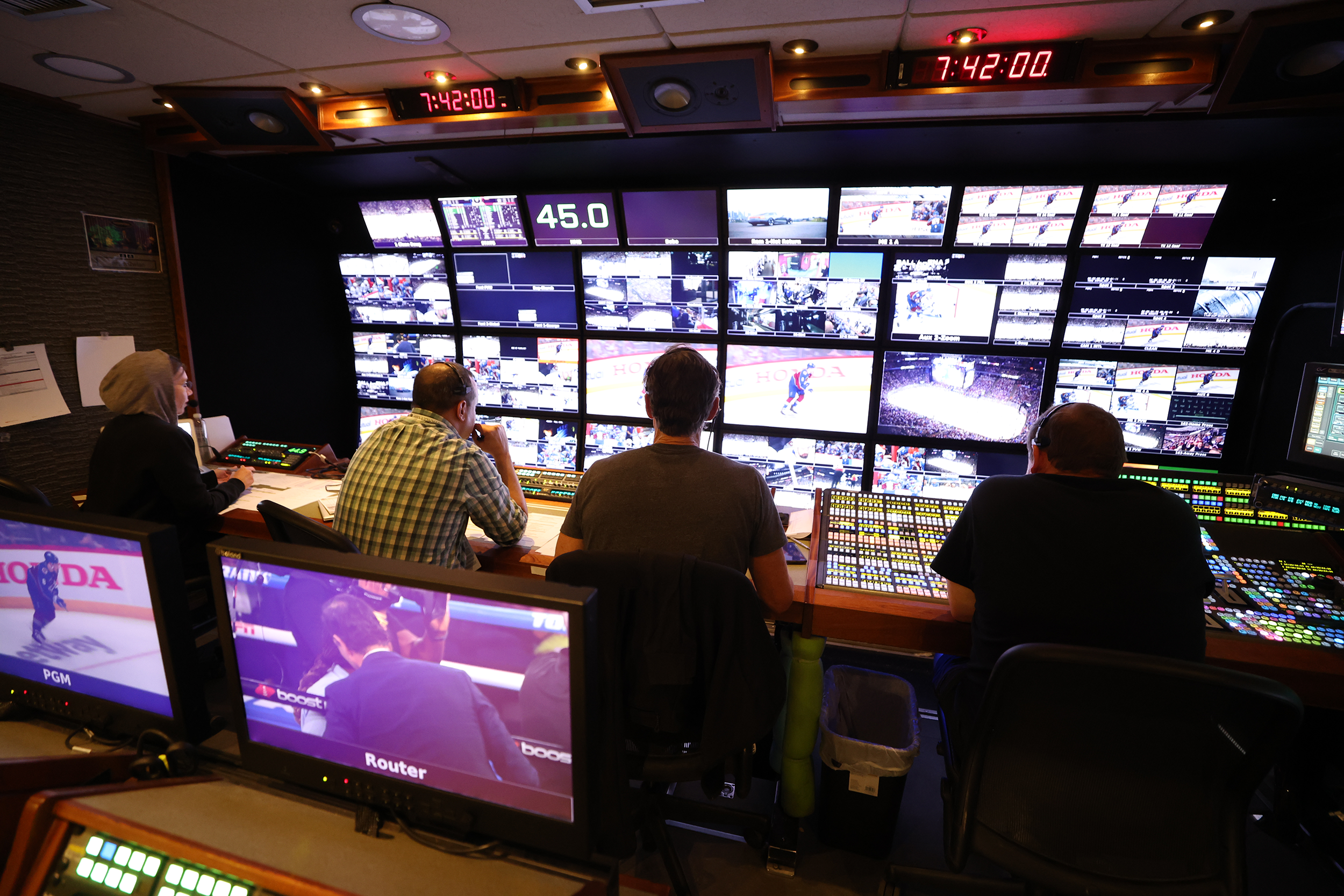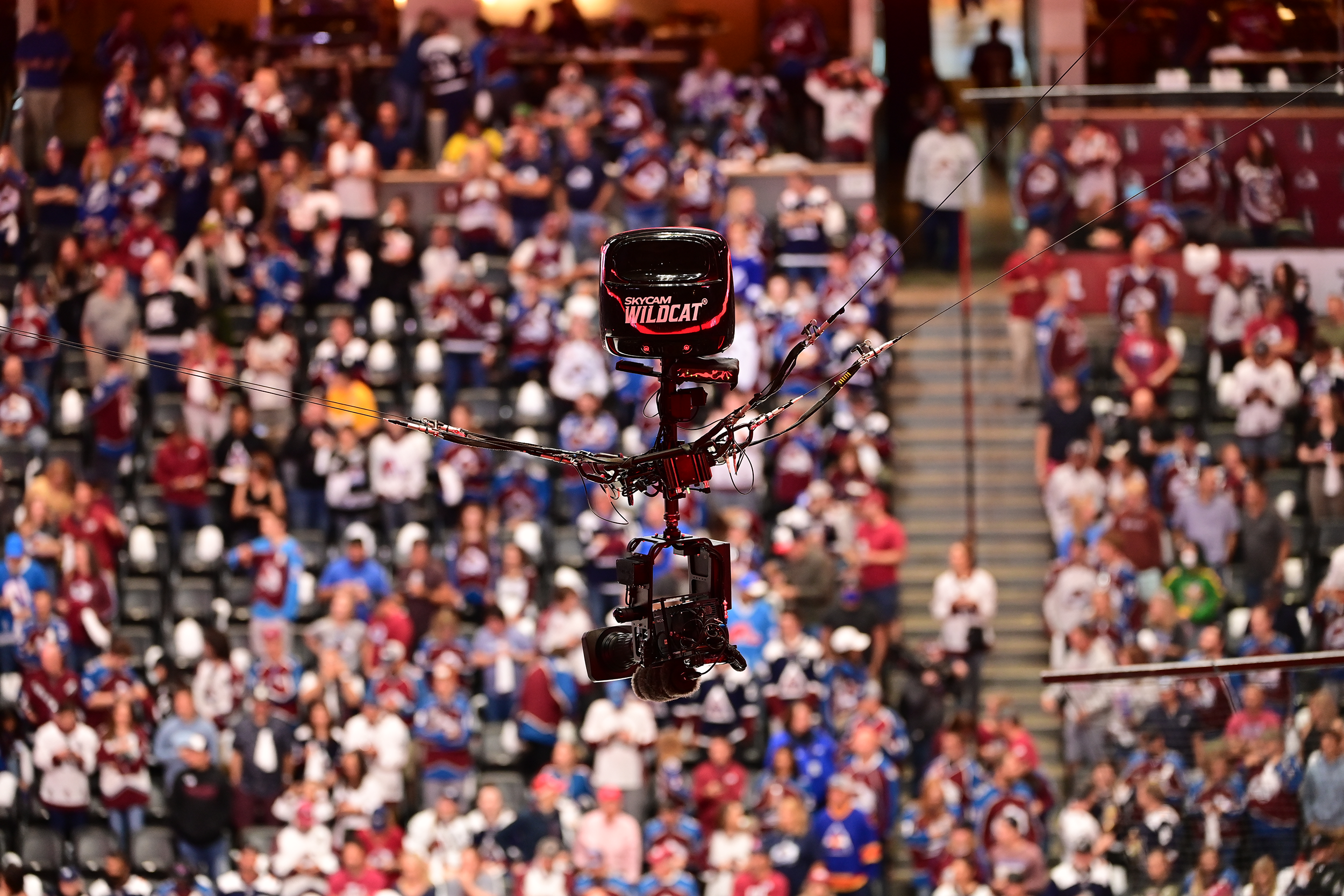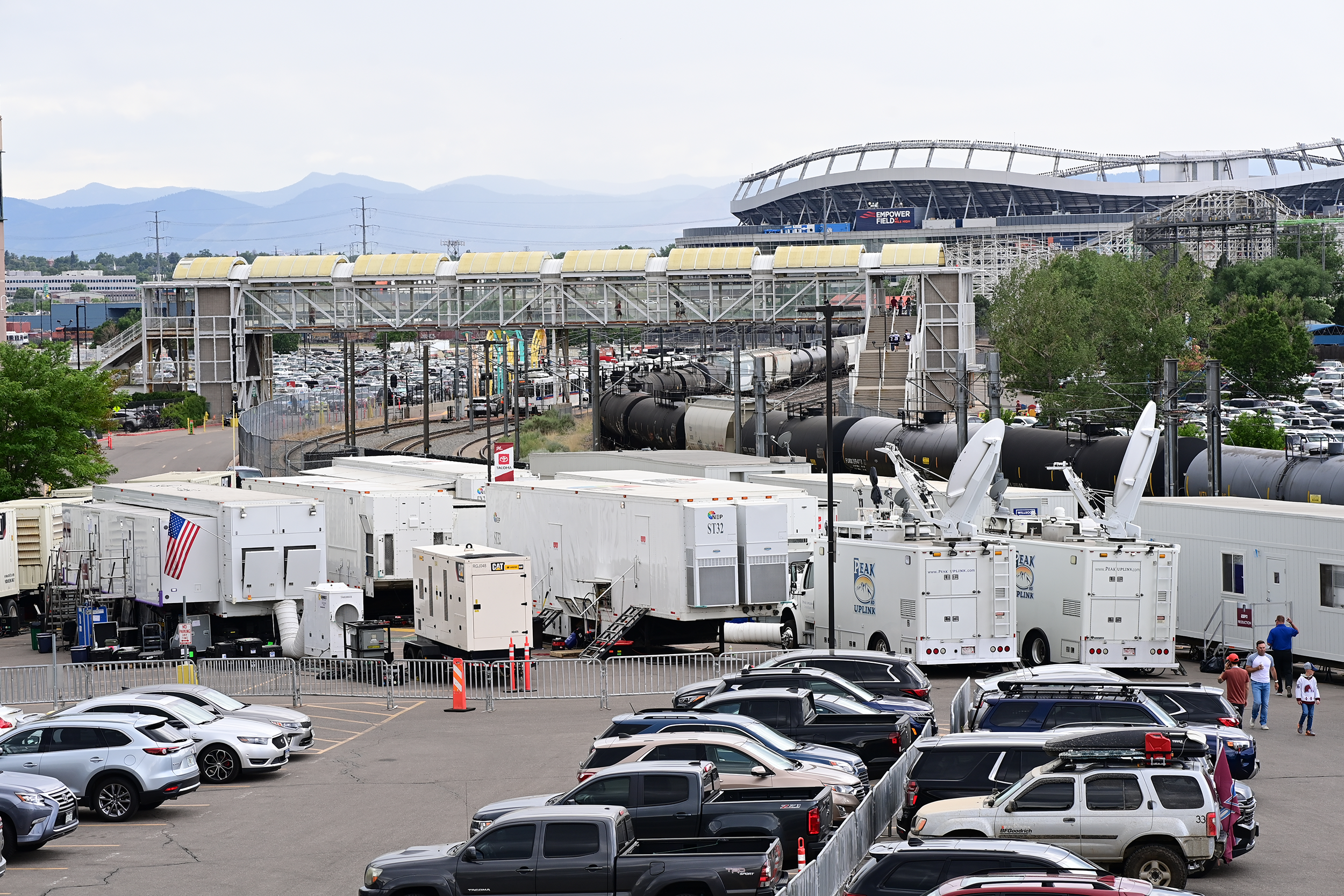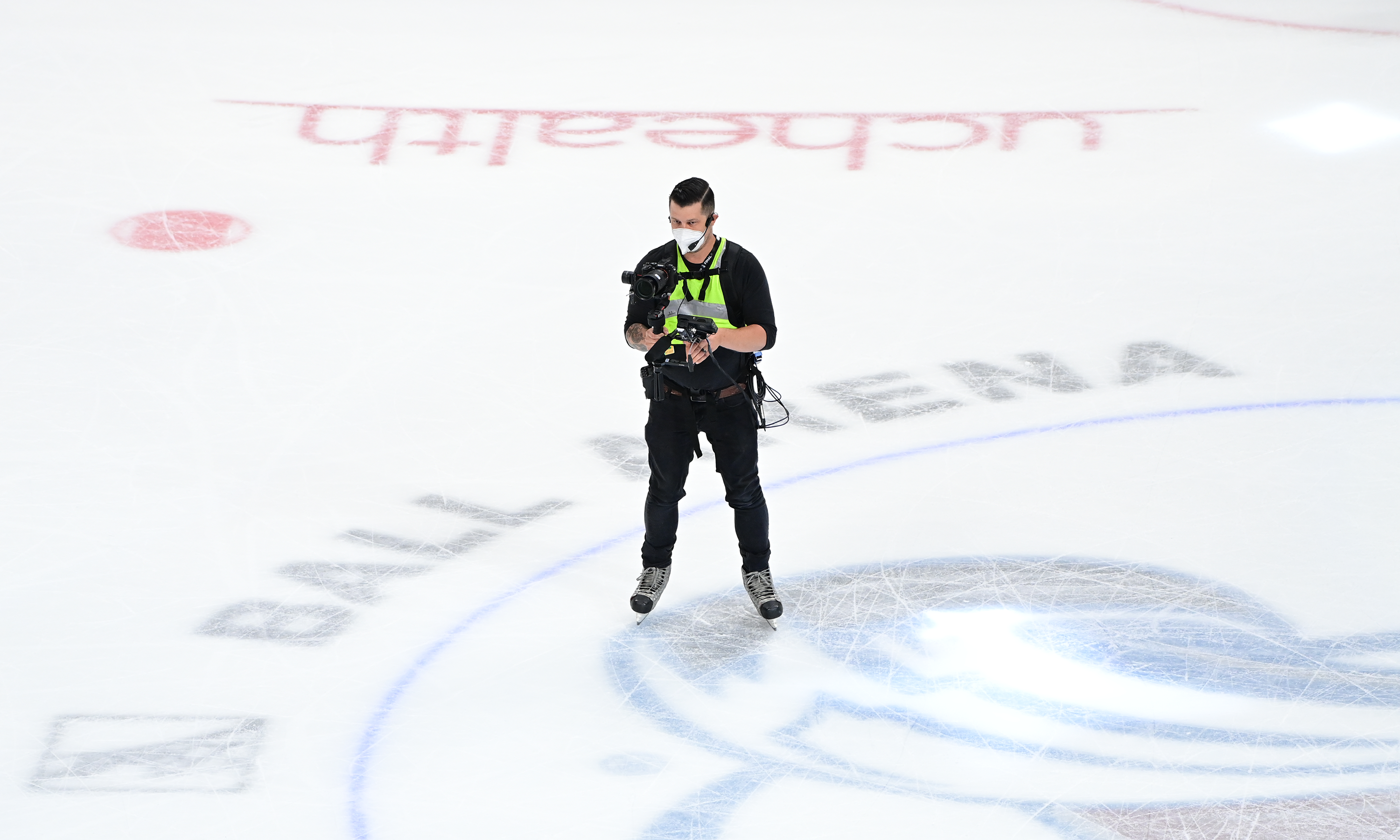Stanley Cup Final: ESPN Offers Visually Appealing Return With Two On-Ice Skate Cams, Cabled Aerials, 10 Super-Slo-Mos, and More
Multiple players and coaches will wear microphones for in-depth audio coverage
Story Highlights
For many at ESPN, the return of the Stanley Cup Final to the company’s programming lineup is not only a fitting culmination to its first full season of NHL coverage since 2004 but also a stark reminder of how far the broadcaster has come in just 15 months since the announcement of Walt Disney Co.’s seven-year rights agreement with the NHL.

Inside the ESPN production truck during Game 2 of the 2022 Stanley Cup Final: ESPN’s lead producer/director team for the NHL is Jeff Dufine and Doug Holmes. (Photo: Phil Ellsworth/ESPN Images)
“We started this thing with nothing,” says Jeff Dufine, lead producer, NHL game coverage, ESPN. “Actually, we had one thing: we had the music. Literally, a year ago, that’s all we had. We didn’t have production teams. We didn’t have any operations folks lined up. We didn’t have trucks. We didn’t have equipment. It has been a huge lift, but we’re really proud about how we got here and the product we put on the air.”
In essentially a summer, ESPN recruited a group that produced more than 150 games for ESPN, ABC, and ESPN+ during the 2021-22 campaign, which has included a playoff run and now the Stanley Cup Final. On Monday evening, the series shifts to Tampa for Game 3, with the Colorado Avalanche carrying a commanding 2-0 lead over the Tampa Bay Lightning.
Specialty Cams for Star Power
Cameras have been a star of this series — most notably, specialties including a cabled aerial camera (Skycam Wildcat), Ankle Cams in the lower corner boards, two Skate Cams (on-ice shallow–depth-of-field rigs operated by Zac Laszuk and Steven Smith), and more than 10 super-slo-mos.

Skycam Wildcat is up in both arenas to offer a fresh, aerial look to ESPN’s game coverage of the Stanley Cup Final. (Photo: Phil Ellsworth/ESPN Images)
ESPN is working closely with Canadian broadcasters Sportsnet and TVA, as well as with NHL Network and the NHL itself, sharing those resources and adding about 25 camera angles for the front bench to use. That includes a camera in the Situation Room in Toronto that can be shown on-air during a replay review.
Dufine sees the various angles as simply enhancing a series full of fantastic storylines for him and director Doug Holmes. The overarching storyline is simply a matchup between a two-time defending champion looking to cement a dynasty and a young, star-powered team on the rise.
“We’re fortunate,” Dufine says. “These, I think, are the two best teams in hockey. Colorado has been that team the entire regular season, and we all know that Tampa’s going for three in a row. And both of the coaches are super-insightful; they’re a walking soundbite. They’re both phenomenal when we meet with them, and they’re really bright NHL minds. You look at their teams, and there are Hall of Famers everywhere you look.”
Maximizing Space at Each Venue
Behind the scenes, the production compounds for the Final are split, with NEP Broadcasting in Denver and Game Creek Video in Tampa. Games 1 and 2 in Colorado were handled by NEP EN2 A and B units, with Supershooter 32 and ST32 anchoring the operations. On hand for Games 3 and 4 in Florida are Game Creek Spirit A and B units, Maverick, and Edit 3.

Because of space limitations, ESPN chose to locate its live-production compound outside Ball Arena for Games 1 and 2 of the series. (Photo: Phil Ellsworth/ESPN Images)
According to Erin Orr, senior manager, NHL remote operations, ESPN, each venue offers unique layouts and challenges in producing an event the scale of a Cup Final. In Denver, ESPN made the call to move the broadcast compound from the traditional dock location inside Ball Arena, positioning it instead in a remote lot outside. The regular dock simply didn’t offer enough space for the resources needed by all parties. A cable bridge was built to link the broadcast trucks to the broadcast panel, and the effort required extensive cable planning.
Tampa, too, poses limitations. Compound space in Florida is very tight and requires a well-organized dance to ensure that all trucks arrive and are positioned properly within the space.
Additional cable infrastructure has been added to both venues to support a robust sharing of resources by ESPN and other broadcasters onsite.

ESPN has added a second Skate Cam for the Stanley Cup Final. Here, operator Zac Laszuk runs a rig shooting images with a shallow depth of field during Game 2 in Denver. (Photo: Phil Ellsworth/ESPN Images)
Orr praises the operations team for mastering the grab bag of obstacles that faced the crew this postseason — and in this series in particular. That ops team includes Senior Operations Specialist Jeff Werner; Associate Manager, Operations, Catherine Carroon; Remote Operations Coordinator Carson Kenney; Operations Specialists Brock Wetherbee and Jon Winders; and Operations Producers Katy Abbott, Tim Denyes, Phil Erwin, Diana MacLeod, Matt Pecarovich, Andrew Schneider, and Dave Walker.
“Together, production and operations worked hand-in-hand and learned the importance of discipline, communication, respect, and, above all else, humility,” notes Orr. “Most of our team is new to the sport of hockey, but we assembled a team with mountains of experience in sports coverage, worked closely with the league, and designed our coverage from the ground up to serve our loyal fans.”
Says Dufine, “It has been a pretty amazing year. To walk around our compound this week, there’s a lot of smiles because we see the light at the end of the tunnel, and we’re all just so happy to be here.”
Audio for Access and Ambiance
On the audio front, ESPN is deploying more than 50 microphones per game in such positions as within the boards, in player pads, on referees, in the nets, and even just outside each team’s locker room.
On each night, Dufine says, the goal is to mike up four players and both coaches for deeper, all-access–level audio.
The Stanley Cup Final continues with Game 3 on Monday (8 p.m. ET) and Game 4 on Wednesday (8 p.m.). The entire series is available on ABC and ESPN+ in the U.S.
